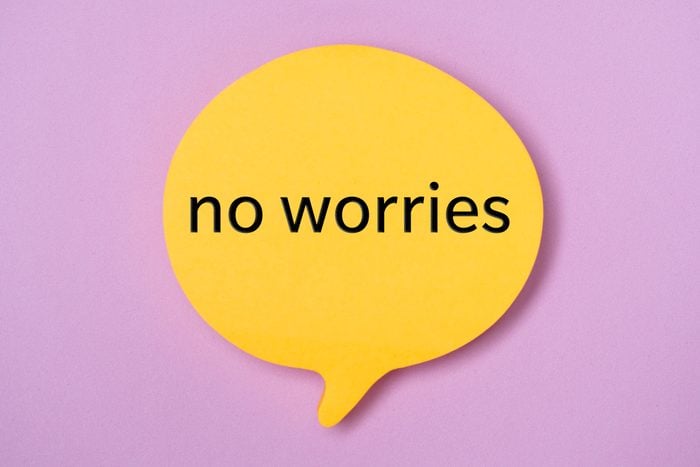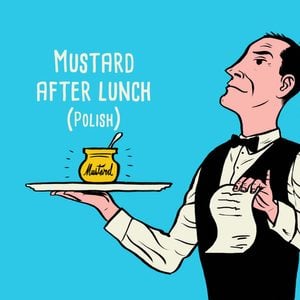Where Does the Phrase “No Worries” Come From?
Updated: Feb. 09, 2022

Bring some Aussie attitude to your everyday life with this common expression.
English expressions can be very perplexing, especially when you don’t know where they came from and can’t possibly imagine it. For instance, why do we say “spill the beans” when we’re not talking about actual beans? Why do we “knock on wood“, quit something “cold turkey“, or call something a “dime a dozen“? But sometimes, the meaning of a particular expression is more or less obvious, but the origin still provokes curiosity. Why do we say “no worries,” and why is it so closely associated with Australia? Plus, check out more fun idiom origins explained.
What does “no worries” mean?
It certainly seems simple enough (well, at least in an “easier-said-than-done” way). But there are a couple of slightly different implications and uses for “no worries.” There’s, of course, the slightly more literal interpretation, of “no worries” as a “don’t worry, be happy”–akin mantra. It can actually mean that you try to live life without worry. But you’re less likely to encounter that in everyday conversation.
A more common meaning of “no worries” is as a response to “thank you”—a “chill”-er, breezier “you’re welcome.” Another potential use still (though incredibly similar) could also be, rather than as a response to “thank you,” as a response to “I’m sorry.” The same way you’d say “don’t worry about it” if someone apologized for a minor offense, you can save a few syllables with “no worries!” Make sure you also read up on why we say “piqued my interest.”
Where did the phrase “no worries” come from?
It’s a bit of a stereotype that Australians originated the expression “no worries” and use it all the time, and that it’s emblematic of the country’s laid-back, happy-go-lucky culture (their surfing culture in particular). And, well, that’s actually accurate! It’s originally an Australian expression (the “you’re welcome” meaning in particular). First recorded in the 1960s, the expression gained popularity in Australia’s neighbor, New Zealand, and in Asian countries like Singapore and Malaysia, too.
According to Google and Quartz data, its popularity in the United States spiked through the 1980s, ‘9os, and 2000s. This could have been due in part to cross-cultural influence between Australian surfers and Californians. But the most likely explanation probably just boils down to pop culture! Paul Hogan’s Mike said it in the 1986 hit film Crocodile Dundee, and U.S. commentators said it frequently during the Sydney Olympics in 2000. You hear it in early-2000s Australian-influenced media from The Crocodile Hunter to Finding Nemo. And, not Australian but incredibly influential, we of course have 1994’s The Lion King and a certain problem-free philosophy. Put that all together and you have the popularity of “no worries” in the States that continues to this day. Find out where the bizarre expression “cat’s out of the bag” comes from, too.
Synonyms for “no worries”
We know what you’re all thinking—yes, “hakuna matata” is a synonym for “no worries” (in the “mantra” sense). “Hakuna matata” actually is a Swahili expression, one that translates to “no trouble,” “no problems,” or “take it easy.” So its use in The Lion King was more or less accurate. “Take it easy”; “don’t worry, be happy”; and “it’s all good” can also convey the spirit of “no worries” in this way.
If you’re using it as a response to “thank you,” the most obvious synonym, as we’ve established, is “you’re welcome.” But “no problem” is another good one, and, like “no worries” itself, it can be a response both to “I’m sorry” and to “thank you.” “It’s all right,” “don’t sweat it,” and “sure thing” are other choice synonyms.
Is it correct to say “no worries”?
A source of confusion over this expression comes when would-be users might wonder if they’re saying it right. Is it “no worries” or “no worry”? After all, “no problem” is singular. Should “no worries” be too? Further complicating matters, the first recorded use of the expression in the Oxford English Dictionary does say “no worry,” not “worries.” Recorded in a 1965 OZ magazine, published in Sydney, it was thus: “No worry..it’s amazing what a few schooners of jolly does for a bloke.”
However, no need to worry (eh?)—both are technically correct, and “no worries” is more common today. While “no worries” is not a particularly formal expression, it’s not in any way incorrect!
You should also keep in mind, though, that “no worries” is best used as a breezy response or a frivolous declaration of your vibe. If you use “no worries” as a response to someone’s genuine worries or stressors, that could easily come across as insensitive or make things worse. It’s certainly one of the things you should never say to someone experiencing anxiety. But in situations where it won’t be construed in that way, we think you should say it as much as you please! Next, find out two other puzzlers: why we say “take it with a grain of salt” and “break a leg“!
Sources:



